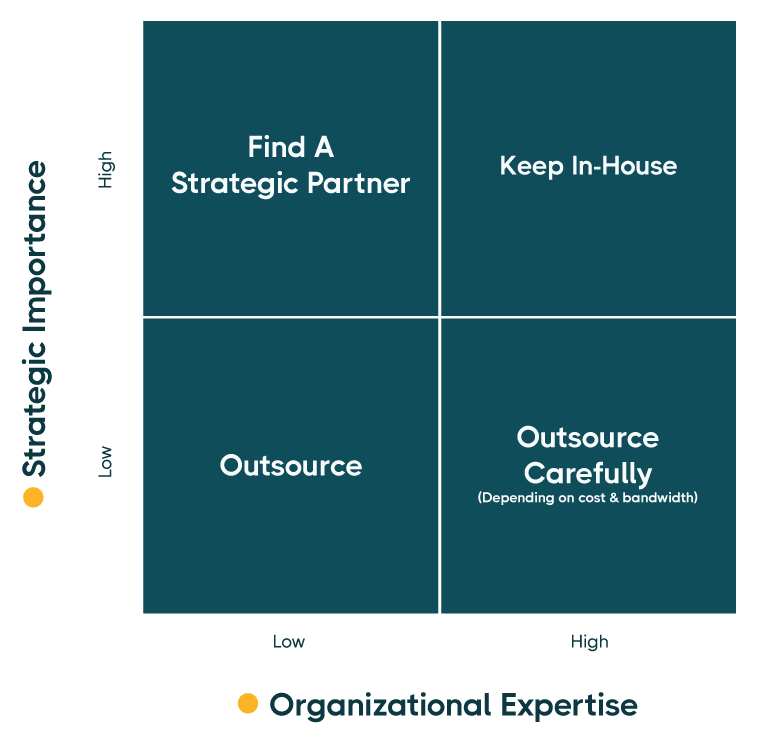3 min
Should you In House or Outsource your Marketing Manager?
By David Lee

Deciding whether to in-house or outsource your marketing is is a complex decision that can be paralyzing because there are so many factors and what-if scenarios.
Although there is no trusty magic 8-ball to find a quick answer, there is a framework to guide and simplify the outsourcing decision-making process.
A simple but effective framework to use is to approach the decision outsourcing vs in-house to two main factors:

1. The strategic importance of the task: Does this activity give your company a competitive advantage?
2. The organizational expertise: Does your staff have the expertise to excel at these tasks?
Keep in house
- In deciding on keeping the marketing function in house, there are two questions you need to ask:
What output / result do you need from the marketing manager?
Does it make financial sense to have an in house marketing manager?
The role of a marketing manager is a blend of business management and technical skills. Here is a typical job description:
Job Description of a marketing manager
Responsibilities
- Develop Annual Marketing Strategy
- Set Annual Sales Goals
- Develops Quarterly Marketing Campaigns
- Develops Monthly Marketing Campaigns
- Execute Monthly Marketing Campaigns
- Analyze and optimize Marketing Campaigns
- Annual, Quarterly & Monthly Reporting
- Manage Budget and P&L statement
- Manage e-commerce marketing team, including vendors
- Accountable for Sales Goals
- Manage Shopify Store
- Technical SEO
- App Support
- Shopify Web Support
- Web Design / Development
- Campaign Configuration
- Store Configuration
Qualifications
- Bachelors or Masters degree in marketing or business
- 4+ years experience in digital marketing
- 3 years in supervisory experience
- Experience in managing e-commerce platforms
Skills
- Analytical mindset, strong skills using excel and managing a budget, understands data and how to interpret results.
- Exceptional organizational skills and is process driven
- Solid communication skills, builds rapport with team and vendors, can influence and make data driven decisions.
Typically, according to salary.com, the typical e-commerce manager salary is $116k with higher performers earning $150k. You can probably add 25% to that figure to account for benefits, health insurance, payroll taxes, bonus, education/training and vacations. So, in the end as an employee, you can expect the cost to run about $145k to $185k per year.
You can find competitive information like this at Salary.com
For some larger e-commerce companies, the sales volumes support bringing on an internal resource. Here is an example of how you can visualize the cost of an e-commerce marketing manager as a percentage of revenue.
| Gross Sales | $2M | $3M | $4M |
| Salary | $150k | $160k | $170k |
| % of Revenue | 7.5% | 5.3% | 4.3% |
For most e-commerce companies with annual revenue less than $5M, it might be a pretty big financial burden and risk to have this talent in house.
Find a Strategic Partner
This is the”Do it for you model”, where you, as the business owner, need to stop managing activities of the marketing agencies and start managing the results of a company that has a shared responsibility model and their financial success is dependent on yours. The fundamental rules of engagement would be look like:
- Provide the same function as an e-commerce marketing manager
- Cost less
- Willing to be held accountable for results, just as an employee would
At Do What Works, our management fee is based on a percentage of revenue that is tied to the annual sales of your company, but it is around the 4% range. Also, we have in place a performance incentive, just like you would put one into place for an employee for exceeding sales targets for the quarter. This allows you to tap our talent pool at a fraction of the cost of an employee.
The best way to scale your e-commerce business to to find a resource who can manage the Digital Commerce Department so that you can level up to managing results as the CEO of your company.
